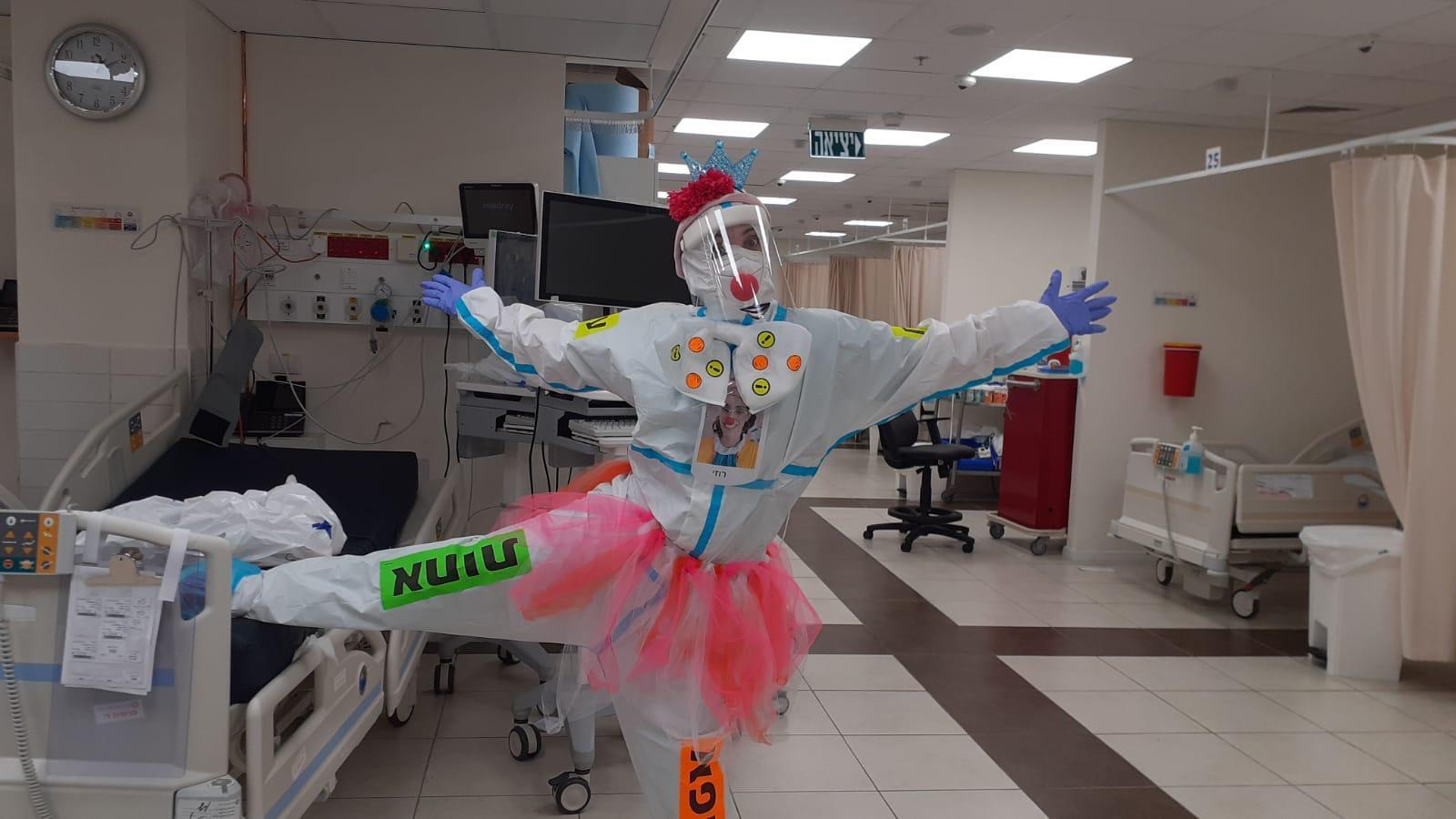For the last seven years, Leah Weiss has been working as a medical clown at Sha’arei Tzedek Hospital in Jerusalem. Most of her work is with children in the pediatric ward.
But when the hospital opened a COVID-19 ward back in March, she knew that the clown in her could help patients — no matter their ages.
“Wherever [she’s] needed, that’s where [she] goes, and I felt that we’re very needed there,” Leah says.
At first, the experience was overwhelming, Weiss says. It was tense and felt “like a battlefield.” But very quickly her clown persona, Rosie, knew what to do.
A medical clown’s job is to bring smiles and laughs to patients. Their work can reduce anxiety and improve the well-being of people in the hospital.
“Obviously, the doctors, they take care of the body. And we come in, we take care of the soul. And it integrates together, and the doctors understand that.”
“Obviously, the doctors, they take care of the body,” she says. “And we come in, we take care of the soul. And it integrates together, and the doctors understand that.”
In times of COVID-19, medical clowns have to work extra hard to stand out: Like doctors and nurses, they too must wear hazmat suits to work in the hospital. They must forego parts of the costumes they usually wear and are forced to reinvent themselves.
At the back of the COVID-19 ward, there’s a box labeled, “Rosie’s corner.” Weiss pulls out a pink and white tutu she made herself, along with a pink hat with a stringy red pompom on top and a blue plastic tiara. She puts everything on over her already stifling medical suit. And of course, the clown’s trademark: the red nose.
Israel is considered a world leader in medical clowning. The first school ever to offer a full undergraduate program in medical clowning was Haifa University. Leah is one of more than 100 medical clowns working in Israeli hospitals today as part of the Dream Doctors Project, which aims to promote medical clowning as an officially recognized paramedical profession. In Israel, they’re considered part of the medical staff.
Related: The healing clowns of Haifa
Once she’s all prepared, Weiss — or rather, Rosie —starts making her rounds. Rosie speaks four languages, including a bit of Arabic.
Rosie walks up to a patient in her 60s who is sitting on her bed wearing regular clothes. “How are you?” Rosie asks. “Don’t worry. You’ll be out in a day or two.”
The patient says she’s being released today, and Rosie breaks into a cheer.
“I met her here last time, and she was tired and weak. It’s great news, it’s happy,” Rosie says afterward of the patient’s departure.
As Rosie makes her rounds, patients raise their heads and smile at her. They’re happy to see her. Further into the ward, there’s a rush of doctors and nurses moving from patient to patient. Rosie and a fellow clown try hard to help everyone in the ward relax, and sometimes the staff plays along.
As Rosie arrives at the bed of a patient named Avraham, the attending doctor jokes that Avraham was worried when he heard that clowns were let into the ward.
“You got nervous?” Rosie asks the patient.
“Yes,” the man replies, laughing.
“Well, how do I look then?” Rosie asks as she spins around in her tutu.
As her shift continues, Rosie and another clown pull out a portable speaker and play songs for the patients, ranging from contemporary Arabic tunes to Hebrew classical oldies. For a brief moment, the harmony of beeping machines and coughing patients is interrupted by music.
But when Rosie meets patients who are severely sick, her demeanor changes. The jokes are put aside to make room for compassion and kindness. Most of the patients in the COVID-19 ward are in their 60s or 70s, and some of them suffer from dementia. Rosie says many of these patients don’t know where they are. Alone and unable to have visitors due to coronavirus restrictions, they’re often confused and frightened.
”When I start talking to them, I see sometimes they just look at me and then tears start to come down,”
”When I start talking to them, I see sometimes they just look at me and then tears start to come down,” Rosie says. “It breaks my heart. Nothing you could do. I mean, just make them comfortable and make them confident at the same moment.“
Rosie says that rather than focusing on the patient’s condition, often she’ll try to simply make a human connection.
Related: Israel’s hurried school reopenings serve as a cautionary tale
At one point, a nurse asks Rosie to meet Ben, a 32-year-old patient who has been in a vegetative state for some time and recently contracted COVID-19. Two photos of Ben have been taped to the wall near his bed. In them, he looks lively and cheerful, but now he’s only able to blink.
Rosie gently introduces herself and asks Ben how he’s doing. His eyes are wide open. Looking at her as one of the nurses takes a blood sample from Ben’s arm, Rosie places a phone near his ear. She plays Ben the song “May You Always Smile,” by Israeli singer Yuval Dayan.
“May you always smile,” she sings. “That’s all I ask for.”
Weiss says that in these difficult times, having Rosie in her life has saved her. She says that Rosie always reminds her that the most important thing to do right now is to keep smiling.
